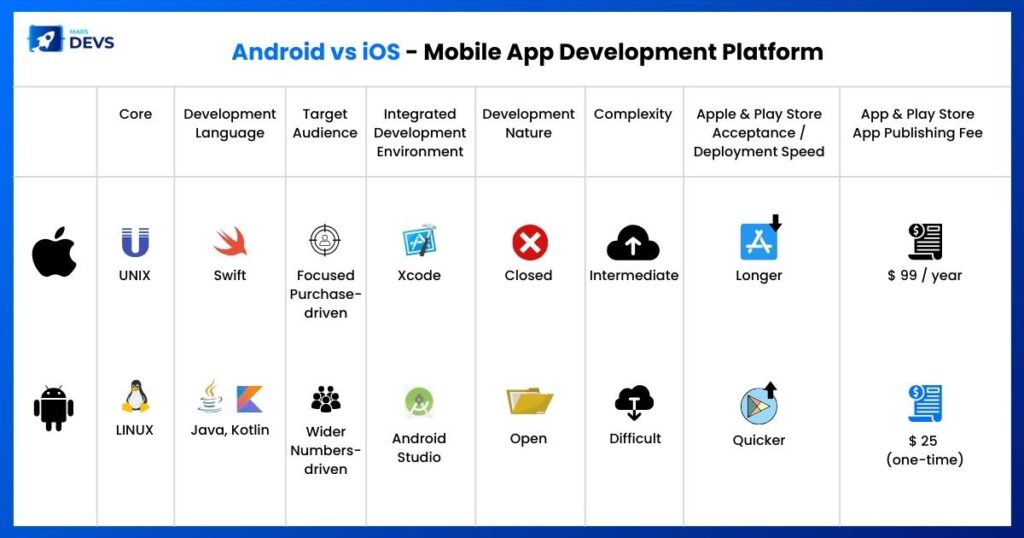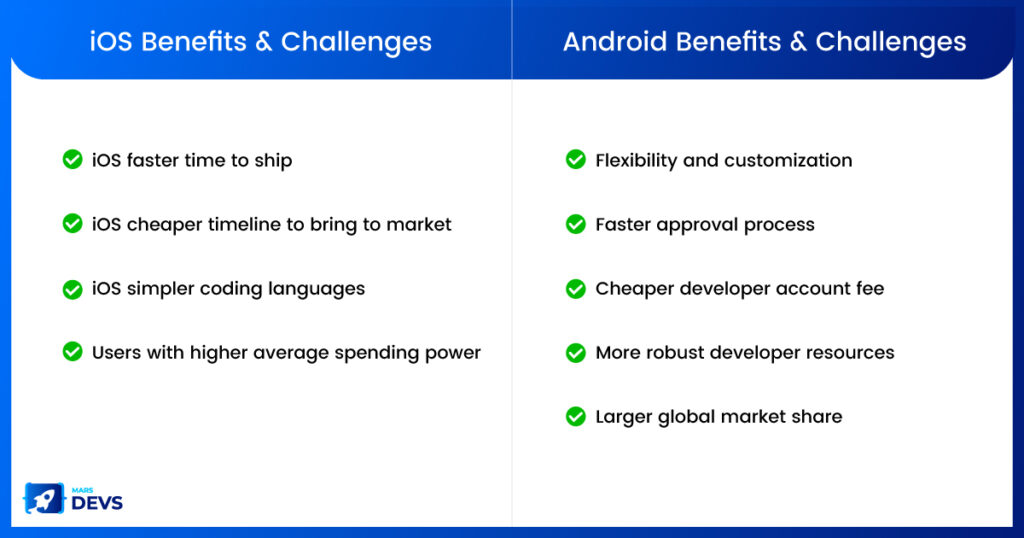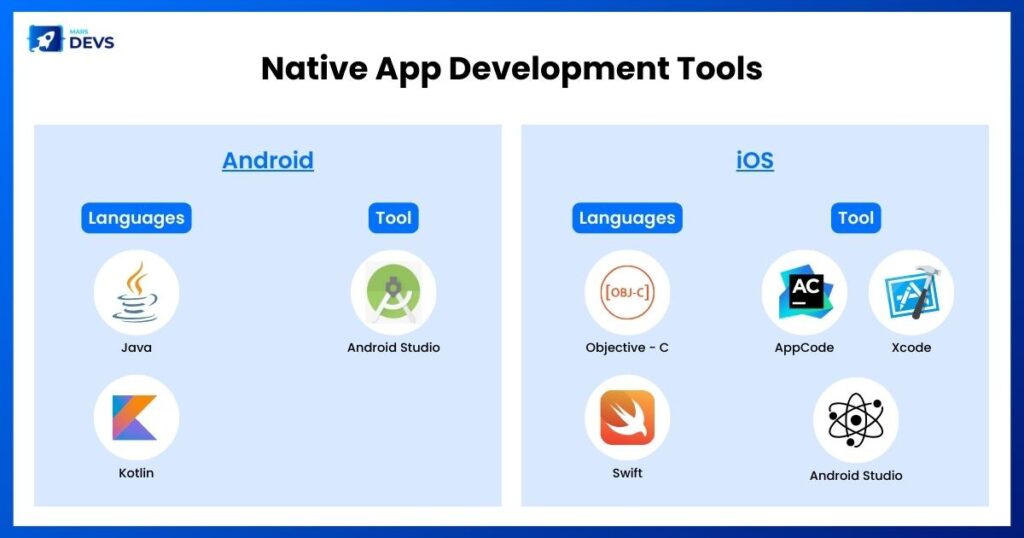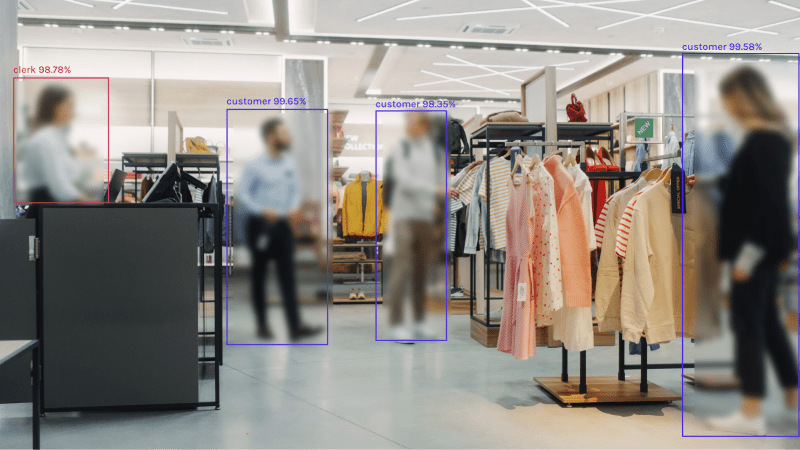iOS Development vs. Android App Development

Mobile app development is a rapidly expanding area in the software manufacturing sector.
Why? Because of the increasing number of people accessing the internet via mobile phones and tablets, businesses can now reach a big audience through mobile app development. Daniel Bæk explains, “Tech will transform from something we incorporate to a seamlessly integrated experience that’s ‘on’ every time.” And what better than mobile apps?
If you are considering creating a mobile or tablet application, you should know that the mobile industry is divided into two segments: Apple iOS & Google Android apps. Whenever someone creates an app for mobile platforms, there’s always a comparison between iOS & Android applications.
Both platforms are excellent, but selecting one might take much work. To simplify things, we have the best guide to end the debate between iOS Development and Android App Development. Let’s look at the iOS vs. Android development comparison and which will fit your needs!
Introducing iOS Development and Android App Development

Before you debate whether to build an iOS or Android app, let’s know what they stand for. Android application is software that needs an Android operating system. As the Android platform was created for mobile systems, an Android application is often built for a tablet PC/smartphone that requires the Android OS.
Individuals or businesses can create them based on programming languages, including Kotlin/Java. Over a million people worldwide use Android apps & have become an essential component of current mobile technology.
As per the sayings of Sundar Pichai, “There are 7 billion people in the globe & I assume phones are the ones that most people can access a modern computing device. With Android, we must provide that for the benefit of people.”
What about iOS apps?
Building mobile apps for Apple devices such as the iPad, iPhone, and iPod Touch is known as iOS app development. The software is written in Objective-C or Swift programming languages and can be downloaded from the App Store. It is created specifically for Apple mobile devices and adheres to the Darwin operating system methodology.
As Steve Jobs puts it, “We think Android is fragmented & becoming more fragmented by the day. Ultimately, Apple plans for the integrated structure & the user isn’t necessarily the system integrator.”
Now, let’s know the benefits of the two.
iOS vs. Android Development – The Many Benefits

When comparing Android apps against iOS apps, there still needs to be a clear winner. Both are excellent platforms. As a result, various iOS & Android app development businesses believe that the platform you choose is heavily influenced by the type of audience you wish to reach.
So, what are the advantages? Let’s take a look.
Android Development
- Flexibility: The open-source functionality enables complete program customization with no restrictions.
- Global Crowd: The Android Platform is expanding its influence in developing countries such as Africa, Asia, and South America, where it has a substantial market share.
- Geeky Customers: Android certainly wins regarding geeky people and niche application software.
- Design Principles: Using Google design rules, programmers can develop an appealing UI.
- Minimum Approval Time: Google Play typically approves applications within two days.
iOS Development
- Capability to Reach Developed Countries: iOS app and gadget releases often target first-world developed countries such as North America and Europe. It also expands monetization potential.
- Simple Development Process: Because the iOS development process is simpler, you can grow quickly and at a lower cost.
- Profitable Market: iOS users spend thrice more money than their Android counterparts. Thus, creating e-commerce apps in iOS will be a wonderful chance.
- Availability of Creativity Tools: iOS is a popular game, social media, and novelty platform.
- Strong Security: iOS has a thorough framework to protect user data from developers and company owners.
Now that we have covered what benefits both bring to enterprises let’s compare the two.
Android vs. iOS Development – The Differences
Android app development means creating applications for smartphones and tablets that run the Android operating system. In the meantime, iOS app development is creating apps for Apple’s iOS-based phones and tablets.
Whichever you choose will impact the development and growth of the application. So, let’s look at how Android app development differs from iOS app development and which will be better for you!
- Programming Language
To begin with, you can hire an iOS app developer who normally uses Swift/Objective-C, but Android developers are more likely to use Java or Kotlin. Both have their benefits. Objective-C is often easier to learn because it is more similar to other programming languages (e.g., C, C++). However, It doesn’t support the creation of dynamically linked libraries (DLLs) as Java does.
As a result, many developers pick Java for new applications. The disadvantage is that learning Java takes longer than learning Objective-C due to its complexity.
- App Development Tools

When developing Android and iOS applications, various mobile development tools are accessible. Another element to consider when picking which tool to utilize while beginning your coding adventure is your familiarity with an integrated development environment (IDE).
For iOS, Xcode is the major development tool. However, Android provides broader tools such as Android Studio, Eclipse, Visual Studio, etc. Android has an open development platform that supports various 3rd party apps & tools. It’s a wonderful thing for developers since it allows them to experiment with different features and add additional functionality to their applications.
Apple offers its application development platform, but it has limited tools. Developers can use external tools for app creation, but this limits their ability to experiment with new ideas. As Sundar Pichai said, “One of the commendable factors about an open system such as Android is it addresses every corner of the spectrum. Getting low-cost computing devices at scale to the developing community is helpful to me.“
- Complexity
In general, Android apps are more challenging to develop because a wide range of devices from many manufacturers supports the platform. In contrast, iOS support is limited to a few standardized devices. Creating an app compatible with Android’s larger open-source ecosystem is challenging.
On the other hand, the Apple App Store often has stronger restrictions and quality standards, resulting in a longer and more complex approval process. It makes developing and launching iOS apps within Apple’s exclusive ecosystem difficult.
- Market size and user retention
iOS & Android users account for over 99% of the mobile-based OS marketplace share globally. Android customers have a massive market share globally, but Apple iOS is more widely used in the United States and Australia. North America as a whole has slightly more Apple users.
When it comes to Android, it has a larger market share in Europe, Asia, and Africa. No matter where your target audience lives, it’s apparent that iOS and Android are the two mobile platforms with the most potential for ambitious mobile developers.
However, as Fred Wilson says, “I assume the mobile-based OS marketplace will function same as Windows & Macintosh, with Android in place of Windows. Hence, to stand in front of a massive user following, you must be on Android.“
To ensure that your app has a high user retention rate, check whether it is operating effectively and is well-liked by people worldwide while evaluating its performance. Hiring app developers allows you to create an app with good UI/UX design, lowering the uninstallation rate.
- Development Cost and Return
It is the decisive element when making the ultimate commitment. If you want to launch your app, you must examine the app’s cost and return. What determines the app development cost? 3 things:
- Time required: The more hours necessary, the greater the rates. Based on the SPDLoad study, a simple app can take 2-3 months, and a basic and complex app can take 3-6 months and 9+ months, respectively.
- Tech stack and level of complexity: Obviously, more complicated apps will take longer to develop, increasing development expenses.
- Price of uploading: Currently, you would need to pay around $99 to publish software on the Apple Software Store, whereas Google’s Play Store requires only $25 for publishing an app.
However, you must also worry about app monetization besides the development cost. Three primary methods exist: in-app purchases, paid applications, and adverts.
In-app purchases: In-app purchases (IAPs) are over 2.5 times more expensive for iOS users than Android users. The average iOS user is 50% more likely to start spending money on IAPs than the average Android user.
Ad Monetization: Many iOS applications are ad-free, with only 25% without gaming applications containing adverts & Android applications requiring adverts. As much as 63 percent of Android apps use advertising SDKs (software development kits).
Paid applications: iOS has 6.1% paid apps as of March 2022, while Android has only 3.3% paid apps. Mobile app spending is predicted to reach 185 billion dollars on the Apple App Store and 85 billion on the Google Play Store by 2025.
iOS or Android: What to choose?
Let us ask again: iOS development or Android development? It’s a challenging decision because both have pros & cons. But, in the end, it all comes down to 2 factors: time and money. Isn’t it?
So, choose iOS if you want to target a specific premium clientele and do not have a limited budget. However, Android is the way to reach a global audience, experiment with the app market, or work with a limited budget. And if you need any help with your mobile app development, MarsDevs is your best bet. Get on a free 15-minute call with us!





